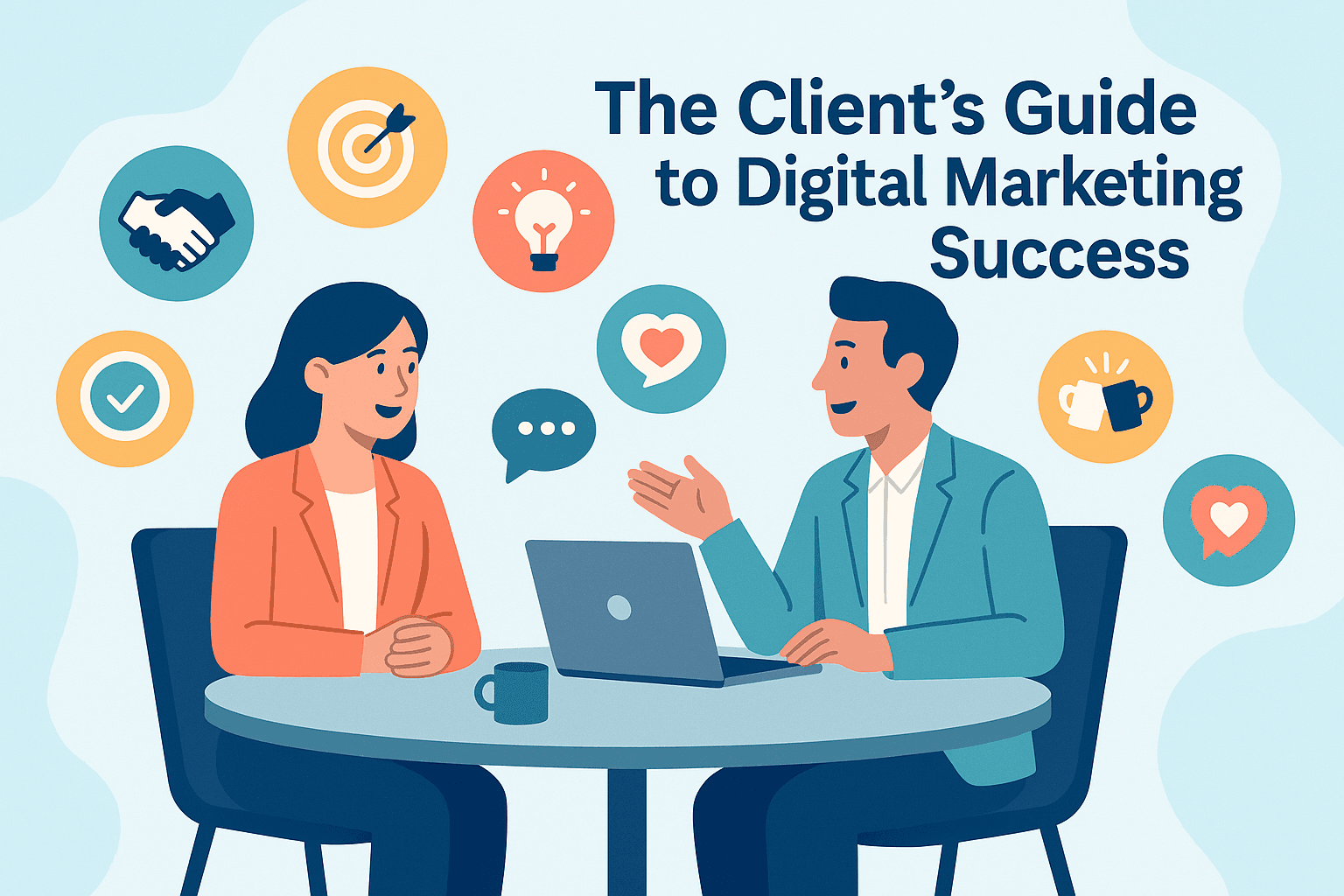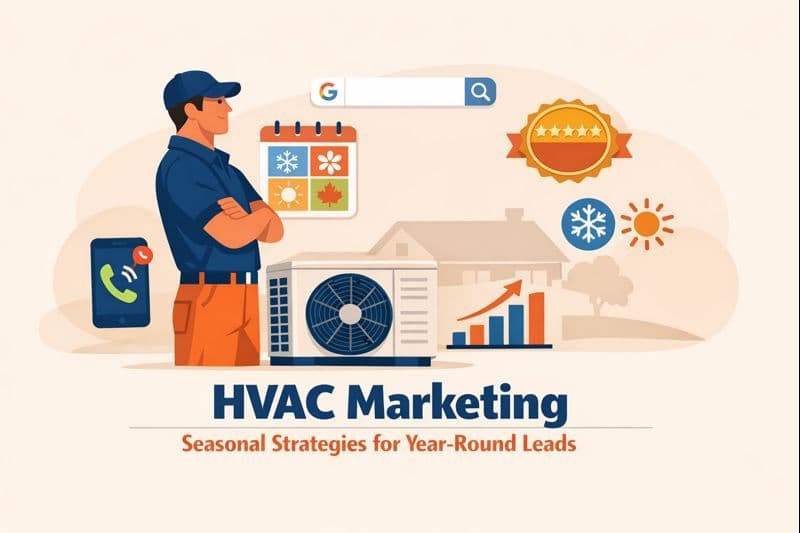Hiring a digital marketing agency is an exciting step toward growing your brand, but it can also feel like stepping into unfamiliar territory. Many business owners sign the contract imagining a flood of website traffic and immediate sales, only to be disillusioned when reality doesn't match the hype. Research shows that this mismatch between expectations and results often leads to client churn; many companies approach agencies believing modest budgets will produce viral campaigns and instant returns. The truth is that marketing is a marathon, not a sprint. Sustainable growth is built on clear goals, collaboration and a measured approach over time.
This long‑form guide pulls back the curtain on what happens inside an agency during the first three months and beyond. It explains the typical timeline and deliverables, highlights the hallmarks of a strong client–agency partnership, and clarifies the crucial role you play as a client. Throughout the article you'll find references to our own service pages—such as search engine optimization, pay‑per‑click advertising, content marketing, social media marketing and web development—to provide deeper insights without interrupting the narrative. These links connect you to practical resources you can explore as you plan your marketing journey.
The First 90 Days – Building the Foundation for Growth
Every successful marketing program starts with a period of discovery and preparation. In the early weeks you won't see dramatic results, but you should feel increasing clarity and alignment. Below is a high‑level overview of what typically happens during the first three months. This framework is inspired by best‑practice timelines from marketing agencies like Mack Media Group, which stresses that the first 90 days are pivotal for setting goals, conducting audits and launching initial campaigns.
| Timeline | Agency activities | What you should expect |
|---|---|---|
| Month 1 (Days 1–30): Discovery & Strategy | • Kickoff meeting to define success metrics and key performance indicators (KPIs). • In‑depth audits of your website, SEO, social media and competitors. • Development of a customized roadmap based on audit findings. | You gain clarity and alignment. Expect to leave this month with a clear picture of your goals, strategy and measurement plan. Major results haven't materialized yet, but you should understand the plan and feel confident in the process. |
| Month 2 (Days 31–60): Campaign Build & Launch | • Creation of foundational content, such as blog posts, ad copy and social media assets. • Technical setup—implementing tracking codes, optimizing landing pages and configuring analytics. • Initial launch of content, paid ads and social campaigns. | Activity begins to ramp up and data starts to flow. You'll see live posts and ads and begin collecting early performance data. Don't expect massive returns yet; this period is about testing, learning and building momentum. |
| Month 3 (Days 61–90): Monitoring & Optimization | • Continuous performance analysis, A/B testing of ads and landing pages, and strategic adjustments. • Reallocation of budget toward tactics that show early promise. • Comprehensive reporting at the end of the quarter with insights and recommendations for the next phase. | You should start to notice positive trends—rising traffic, more qualified leads and better engagement. The first quarterly report should give you a clear sense of what's working and how the agency will optimize moving forward. |
Why Results Take Time
An effective digital marketing strategy rarely delivers overnight success. For example, search engine optimization (SEO) is notoriously slow to bear fruit. According to Search Engine Land, SEO results can take up to three months due to Google's ranking transition algorithm and often require six months to settle into a stable position; new websites may need a full year to show meaningful gains. This delay doesn't mean the work isn't happening—search engines simply need time to crawl, index and evaluate your changes. Even seemingly quick tactics like pay‑per‑click (PPC) advertising or social media ads involve testing, refining and optimizing before they consistently deliver a positive return.
Expectations around conversion rates should also be grounded in reality. HubSpot's 2025 marketing statistics report notes that email marketing—often touted for its high ROI—delivers an average conversion rate of 2.8 % for B2C brands and 2.4 % for B2B brands. While some campaigns may exceed these numbers, they illustrate that truly "high‑performing" campaigns still convert only a small percentage of total impressions. Setting realistic goals early on allows you to celebrate incremental wins instead of chasing unattainable benchmarks.
The Importance of Technical and Strategic Foundations
The first phase of an agency relationship is heavy on research and setup for good reason. Mack Media Group explains that agencies begin by evaluating existing digital assets, reviewing your website, social profiles and ad accounts to identify strengths and gaps. This audit often includes competitor analysis to benchmark your position and audience research to understand who you're trying to reach. With these insights in hand, the agency crafts a tailored strategy that covers content, SEO, social media and paid advertising.
Technical setup is equally critical. Without proper tracking, it's impossible to measure success. Agencies implement analytics scripts, configure SEO analytics tools and optimize the structure of your website for speed and crawlability. Search Engine Land emphasizes that ranking factors include the strength and contextual fit of internal links within your site and external backlinks. Internal links help search engines and visitors navigate your content; to see how this works in practice, browse our blog and notice how related articles are interlinked to improve user experience and search visibility.
Your Role During the First 90 Days
Although most of the heavy lifting is handled by the agency, your involvement remains crucial. Promptly provide any requested assets—such as brand guidelines, access credentials and historical performance data—and offer timely feedback on drafts and deliverables. Delays in approvals can derail the momentum of your campaigns. Share insights about your business, customers and industry to help your agency craft authentic messaging. Consider reading our Decoding Digital Marketing: A Glossary of Key Terms for Business Owners to familiarize yourself with common terminology and facilitate clearer communication.
Beyond 90 Days – The Hallmarks of a True Partnership
Once the foundation is in place and early campaigns are running, the relationship with your agency shifts from setup to growth. The following hallmarks distinguish a transactional vendor from a strategic partner.
Transparent & Regular Communication
Clients don't just want results; they want to feel informed and involved. Online Optimism stresses the importance of clear communication and regular updates—whether via email, reports or check‑in meetings—to build trust. Effective updates should highlight progress toward agreed‑upon KPIs, share insights from data and be honest about challenges. Remember that communication preferences differ: some stakeholders may prefer short weekly summaries, while others want in‑depth monthly calls. During the onboarding process, discuss how often you'd like to meet and what format suits your schedule.
Beyond formal reporting, your agency should encourage open dialogue. Raising questions about strategy, requesting clarification on data or sharing news from your side of the business helps keep campaigns aligned. Trust grows when both parties feel comfortable sharing information, celebrating wins and addressing setbacks. As the Hidden Crisis article points out, radical transparency—including clear reporting and full disclosure about what clients are getting for their investment—is essential for long‑term relationships.
Focus on Business Goals, Not Just Vanity Metrics
It's easy to be dazzled by vanity metrics such as impressions or follower counts. A strategic agency keeps the conversation centered on your business objectives—sales, qualified leads, customer lifetime value—not just clicks and likes. The best partners tie marketing metrics back to your bottom‑line goals and explain how each campaign contributes. For example, our PPC advertising services focus on cost‑per‑acquisition and return on ad spend rather than simply maximizing clicks. Similarly, our content marketing strategies measure success by lead generation and engagement quality, not just page views.
This goal‑based approach requires patience. As noted earlier, SEO may take several months to show results, and email campaigns average conversion rates of around three percent. An agency that constantly reminds you of the long‑term vision and benchmarks progress against realistic milestones will set you up for sustainable growth.
Education and Guidance
Many clients are not marketers themselves, so a good agency invests time in education. Online Optimism encourages agencies to define marketing success together, asking questions about business goals and key performance indicators before any campaign launches. They also recommend being transparent about timelines—explaining that SEO can take months to gain traction, paid ads need testing, and social media engagement builds gradually. By demystifying the process, agencies empower clients to make informed decisions and avoid frustration when immediate results don't materialize.
Education isn't limited to high‑level concepts. Agencies should explain why certain metrics matter, how to interpret data and which factors influence performance. For example, Search Engine Land notes that internal link quality, URL age and external backlinks all influence ranking timelines. Understanding these variables helps you appreciate the rationale behind your agency's recommendations.
Adaptability and Proactive Optimization
Digital platforms and algorithms evolve quickly. A strong agency monitors performance data and proactively tweaks campaigns instead of running on autopilot. Mack Media Group describes how agencies conduct ongoing content research, test and optimize ads, and refine social media approaches based on real‑time insights. They also establish tracking systems and communication channels so that adjustments can be made swiftly.
As your partnership progresses, expect your agency to bring new ideas to the table—whether that's exploring voice search, implementing structured data or integrating AI tools. A forward‑thinking partner adapts to emerging trends while remaining grounded in your overall strategy.
Evidence of ROI and Continuous Improvement
A common question is whether agency partnerships deliver measurable results. Case studies suggest the answer is yes. Social Firm reports that clients who partnered with their agency achieved a 378 % increase in online prospect leads and a 280 % increase in online bookings after combining paid ads, social media and SEO. While these numbers are exceptional, they illustrate how a coordinated, multi‑channel strategy can dramatically improve outcomes compared to isolated efforts.
Regular reporting should capture both short‑term wins and areas for improvement. Look for transparency in how budgets are allocated, which channels drive the highest return and how strategies evolve. Be wary of agencies that rely solely on vanity metrics or avoid discussing underperforming tactics. An agency committed to continuous improvement will pivot when necessary and explain the reasoning behind each change.
Your Role in Success – How to Be a Great Client
Effective partnerships require active participation from both sides. Here's how you can contribute to a smooth, successful relationship and help your marketing agency deliver maximum value:
Provide Timely Feedback and Approvals
Marketing campaigns have momentum. Delayed approvals on content, ads or creative assets can disrupt launch schedules and hamper testing. Commit to reviewing deliverables within 24–48 hours and provide clear, constructive feedback. If multiple stakeholders need to approve materials, establish a streamlined internal process to avoid bottlenecks. When in doubt, lean on your agency for guidance; our consulting services can help you refine your decision‑making process.
Share Business Insights and Data
You are the expert on your business, your customers and your industry. The more context you share—seasonal trends, customer pain points, sales data—the better your agency can tailor its strategy. Invite your agency into strategic discussions about product launches, promotions or operational changes so they can align campaigns accordingly. For example, if you're planning a website overhaul, explore our web development services to ensure your site structure supports SEO and conversion goals.
Trust the Process (and the Experts)
You hired an agency for its expertise. Trust their recommendations—even when they involve new tactics or call for a longer timeline. The Hidden Crisis article points out that many clients leave agencies when unrealistic expectations aren't met. Patience and trust are key to avoiding this trap. If you have concerns, raise them; a good agency will explain its rationale and adjust where appropriate. Remember that adjustments based on data—not gut feelings—are the hallmark of a strategic partner.
Continue Educating Yourself
Marketing is an ever‑evolving field. Staying informed helps you make better decisions and communicate more effectively with your agency.
Conclusion
Hiring a digital marketing agency is one of the smartest investments you can make for your business, but it demands patience and partnership. The first 90 days are about laying groundwork—defining goals, auditing assets, building campaigns and installing the tools needed to measure success. Results rarely appear overnight. According to industry research, SEO can take several months to gain traction, and even high‑performing email campaigns convert fewer than three percent of recipients. Recognizing these realities prevents disappointment and sets you up for long‑term success.
Beyond the initial setup, a strong partnership thrives on transparency, goal alignment, education and adaptability. Agencies that communicate regularly, focus on business objectives, provide guidance and proactively optimize campaigns deliver the greatest value. Clients who offer timely feedback, share insights, collaborate and trust the process are more likely to see remarkable results—like the 378 % increase in leads reported in Social Firm's case study.
Ultimately, marketing is a collaborative journey. By setting realistic expectations, aligning on goals and embracing your role as an active partner, you and your agency can build a relationship that drives sustainable growth and lasting impact. When you're ready to take the next step, explore our digital marketing services or reach out to discuss how we can customize a strategy that fits your unique goals.


